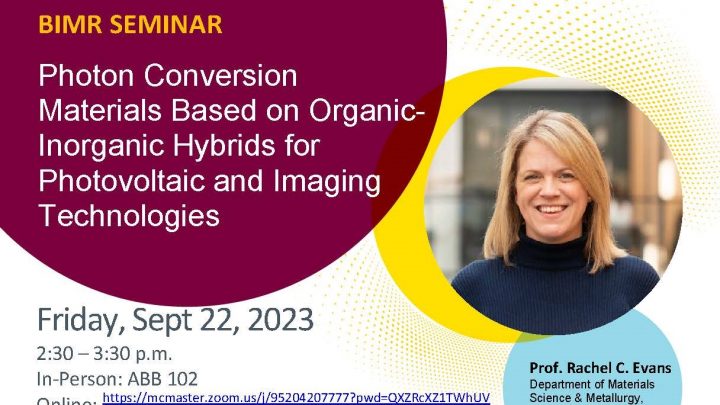Photon Conversion Materials Based on Organic-Inorganic Hybrids for Photovoltaic and Imaging Technologies
Sep 22, 2023
2:30PM to 3:30PM

Date/Time
Date(s) - 22/09/2023
2:30 pm - 3:30 pm
Categories
Prof. Rachel C. Evans
Department of Materials Science & Metallurgy, University of Cambridge, U.K.
Light is ubiquitous in the urban environment – from the sun that shines down upon us to the artificial sources that light-up our devices and homes. While some of this light is used very effectively, for example by plants in the process of photosynthesis, much is wasted, either due to inefficient capture or poor recycling of the broad spectrum of photon energies available. Photon conversion materials can help bridge the energy mismatch between a light source and the collector for example a solar photovoltaic (PV) cell or fibre optic, through use of a photoluminescence process to convert the incident photon energy. Alternatively, photon conversion may be used to avoid triggering unwanted background noise, such as autofluorescence in biological systems, leading to improved imaging resolution.
In this talk, recent highlights from our research into the bottom-up design of photon conversion materials utilising organic-inorganic hybrid hosts will be presented. It will be shown that materials chemistry strategies can be used to control the packing, orientation and placement of emitters, which provides a means of modulating the optical properties – from enhanced photoluminescence quantum yields, to tunable photon energies via Förster resonance energy transfer or triplet-triplet annihilation upconversion (TTA-UC). These characteristics can be exploited to improve light-harvesting and trapping, which can be used to develop highly efficient luminescent solar concentrators (LSCs), optical amplifiers for visible light communications, and sensor platforms for bioimaging. Recent work, in which ray trace modelling is combined with 3D printing to rapidly protype new LSC designs will also be described.
Bio:
Rachel Evans is Professor of Materials Chemistry at the Department of Materials Science, University of Cambridge. She obtained her MChem (2002) and PhD in Physical Chemistry (2007) from Swansea University. She was a Marie Curie Postdoctoral Fellow at the Université Paris-Sud, France and subsequently held an FCT research fellowship between the University of Coimbra and the University of Aveiro, Portugal. From 2009-2017, she was an Assistant, then Associate Professor of Chemistry at Trinity College Dublin. Rachel’s research is highly multidisciplinary, involving polymer, colloidal and photochemistry, and the use of advanced scattering and spectroscopic characterization techniques. Current interests include development of photoactive hybrid materials for luminescent solar devices, indoor photovoltaics, solar-thermal energy storage and nanodelivery. Rachel has been awarded a Consolidator Grant from the European Research Council, the McBain Medal and MacroGroup UK Young Researcher’s Medal from the Royal Society of Chemistry (RSC)/ Society of Chemical Industry (SCI), and the Dillwyn Medal for STEMM from the Learned Society of Wales. She is a Fellow of the Royal Society of Chemistry, the Institute of Materials, Minerals and Mining and the Learned Society of Wales.
In-Person: ABB 102
Online: https://mcmaster.zoom.us/j/95204207777?pwd=QXZRcXZ1TWhUVXdwUStBQkRJNlJsUT09

